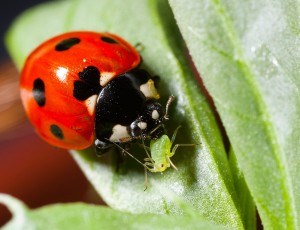It seems that with each year that passes, I am writing more and more on alternative strategies for controls to use in your home garden. Now it is finally warm enough for insect action, I wanted to write about insects and how we can promote better balance in our home environment.
We have made a huge disruption in the natural world with our presence, and especially where we congregate in large and dense communities, it is important to minimize our effects and maximize building back that balance in our outdoor world.
The world of insects is fascinating to the gardener, as their life cycle, the colonies they may live in and their ability to hunt for food all makes them rather remarkable. Even the thought of those little critters walking across your garden in perspective must be like walking from Saskatoon to Regina or Edmonton depending on the size of your garden area.
Sometimes the response by gardeners to any of these critters is to squish or spray now and be rid of those ugly and damaging pests. However, not all bugs/insects are a danger to the plants in our gardens. Not all of the little critters are bad. In fact, insects play a vital role in the biogeochemical cycling of nutrients, the enhancement of the tilth of our soil and are an important part of the natural system of checks and balances that strengthens community stability and of course the essential pollination of flowering plants.
Some of these critters present a more neutral side, doing neither harm nor good, happily living their life in the garden world. Other critters are helpful to the gardener by feeding on insects that do harm to plants thus providing us with safe biological controls for some of the most common garden pests. Nature is also a remarkable thing with creating a balance that we, as stewards of the land, constantly disrupt. It is important for all gardeners and other stewards of the land to learn about the individual critter and its life cycle to determine whether it is friend or foe.
Beneficial insects (sometimes referred to as bio-control agents) are naturally in nature or readily available to farmers, growers and others. They fall into two basic categories with some being predatory and some being more parasitic in nature. Some do a little “host feeding” of both the parasitic and predatory nature. Some of the common predacious beneficial are beetles, wasps, mites and true bugs. The more parasitic beneficial are often miniature wasps and nematodes.
Introducing any biological control can be effective but does not act like a pesticide solution. Let’s take an example by looking at biological control of flies. Spraying a multitude of chemical products on these flies will work for a while, but insects evolve quickly and can develop immunity to the products you are using, which in turn causes us to use more toxic products to gain the same control.
A biological works differently but not as quickly as many biologicals are effective by interrupting the life cycle of the problem critter, and over time gains control of the population.
My personal introduction into the beneficial world occurred when I was an intensive livestock producer and provided an ideal environment to many species of flies by providing livestock, bedding debris and my home landscape to aid these pesky flies in living a happy life. Always looking for a sustainable, environmentally friendly solution, to this out-of-control fly problem, I began using parasitic wasps for fly control. Over time I had no more flies. For me and countless others who embrace this method of control we now enjoy a much more pleasant outdoor experience – even if we do keep critters. For more information please go to or email us at[email protected]
There are many other beneficials we can use in our outdoor living space. These include ladybugs, lacewings, ground beetles, minute pirate bugs, syrphid flies and many more. Watch for the next few columns that will focus on biologicals and how they benefit our garden environments.
Hanbidge is the lead horticulturist with Orchid Horticulture. Find us at ; by email at [email protected]; on facebook @orchidhort and on instagram at #orchidhort.




